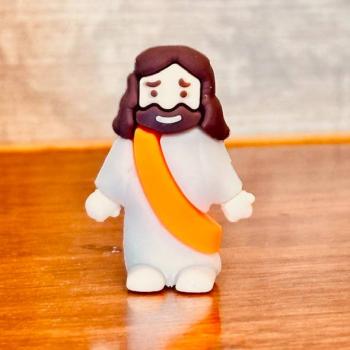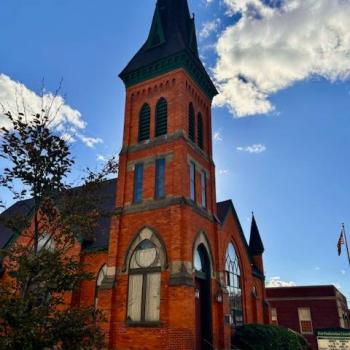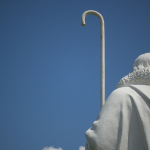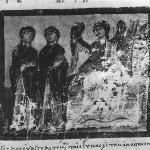*This is a guest post written by Matt Erickson. The views expressed below do not necessarily reflect those of Kurt Willems.
In Shakespeare’s powerful drama King Lear there is a moving scene where King Lear, bereft of the daughter he loves most, Cordelia, and being controlled by his two other self-serving daughters, Goneril and Regan, rushes out into a tempestuous storm.[1]
As the dark storm rages about him, Lear rages about his own suffering and loss. He calls upon the wild thunder and lightning to destroy him and the grief-filled world as he wanders wildly through the darkness around him. Eventually, King Lear goes mad with grief and confusion in this episode. He calls out for justice, meaning, and resolution, but finds none in the isolation of the storm.
In some ways, King Lear’s struggle parallels that of Job. They are both looking for meaning in their suffering.
I’m sure that we’ve all either experienced dark times or been around others who have. It is one thing to experience a brief adversity or set-back, but another thing to endure ongoing suffering for weeks, months, or years.
“We Have Much Yet to Learn…”
Remember that Job suffered great loss. All of his children – 7 sons, 3 daughters – and all of his belongings – 7,000 sheep, 3,000 camels, 500 oxen, 500 donkeys. All gone in one stunning afternoon.
Still, Job could make an amazing declaration:
The Lord gave and the Lord has taken away; may the name of the Lord be praised. (Job 1:21)
Shall we accept good from God, and not trouble? (Job 2:10)
Job was able to make the great declaration of faith in the moment suffering struck. Now, however, we find Job is in a place of ongoing suffering. The initial dramatic declaration of faith is followed by a period of wrestling with that suffering. “Why, God?” is the question which resonates within Job’s mind.
In great fairy tale style, we’d like for God to immediately restore the fortunes of Job. We want to skip from the end of chapter 2 right on to the end of chapter 42 and have things put right.
Why do we need the rest of this book? In the words of John Piper, it is because we “have much yet to learn about suffering and about God.”
What Friends Are These?!
When Job’s friends arrive the best thing that they do is sit silently with him. When they begin to open their mouths, things immediately go south.
Their understanding of suffering and God could be summarized most succinctly in the following ideas:
- God corrects or disciplines those who need it
- Sin in one’s life leads to adversity and God’s punishment
- Lack of generosity leads to God’s punishment
- If you confess and repent of your hidden sins, then restoration comes
Job, in their eyes, is encountering suffering, adversity, and dark times as a result of sin in his life which God wants to correct. If only he were to confess his sins and turn back to God, then he would be restored. But there is something about the theological truth that the friends offer to Job which doesn’t ring true.
Here is why Job’s friends’ statements don’t ring true:
- Job’s standing and righteousness wasn’t a joke: two times God described Job as “blameless and upright, a man who fears God and shuns evil” (1:8 ; 2:3); yet, Job’s friends doubted his standing before God; their statements about wrong ways leading to God’s punishment may have been true in general, but not specifically in regards to Job
- Suffering is not necessarily doled out in proportion to one’s goodness or evil: Job rightly understood that “the wicked are spared from the day of calamity” (21:30) and that all too often the righteous are “a laughingstock” to those around them (12:4); the understanding of life that if you’re good you will avoid suffering and if you’re bad you will suffer just doesn’t prove true in life’s realities.
- Sometimes God allows things we do not understand: Job was part of something bigger than him – a cosmic drama behind the scenes – and, as we see later in the book, he never really gets that explained to him; neither his friends nor Job know God’s ways behind the scenes – God’s ways are bigger than us and our understanding
Job’s Growth through Suffering
While the ensuing speeches don’t reveal much further about Eliphaz, Bildad, and Zophar, they do show us something about Job. He begins in despair, cursing the day of his birth and his continued existence. He complains of the absence of God’s justice. He laments his suffering and longs for the finality of death without a future.
But as the rounds of speeches continue, while not letting go of his call for God’s justice, Job’s perspective begins to change. The pinnacle of this is found in chapter 19:
I know that my redeemer lives, and that in the end he will stand on the earth. And after my skin has been destroyed, yet in my flesh I will see God; I myself will see Him with my own eyes—I, and not another. How my heart yearns within me! (19:25-27)
And then in chapter 23:
But he knows the way that I take; when he has tested me, I will come forth as gold. (23:10)
Job may not understand all that is happening to him – his part in it, God’s part in it, Satan’s part in it – but he does experience a transformation that is extremely significant. Job trusts in God’s ultimate salvation even as he wrestles with not understanding his suffering.
And For Us…
Now, what can we gather from this extended passage of Scripture for our own everyday lives? If we do have much to learn about God and suffering, then what do we need to glean from this today?
Perhaps we need to learn something about getting honest with God as a form of wrestling with our suffering. Maybe it is time to allow God to grow our faith through that wrestling. Or perhaps we need to develop as a friend in the midst of others’ wrestling with suffering and God.
Hopefully, like Job, we too will trust in God’s ultimate salvation even as we wrestle with our suffering.
What are your thoughts on the subject of suffering? Do you agree with Matt’s perspective? What stands out to you in this article?
————————————————————————————-
Matt Erickson is the Senior Pastor at Eastbrook Church in Milwaukee, WI, and blogs regularly at <Renovate>: www.mwerickson.com.















